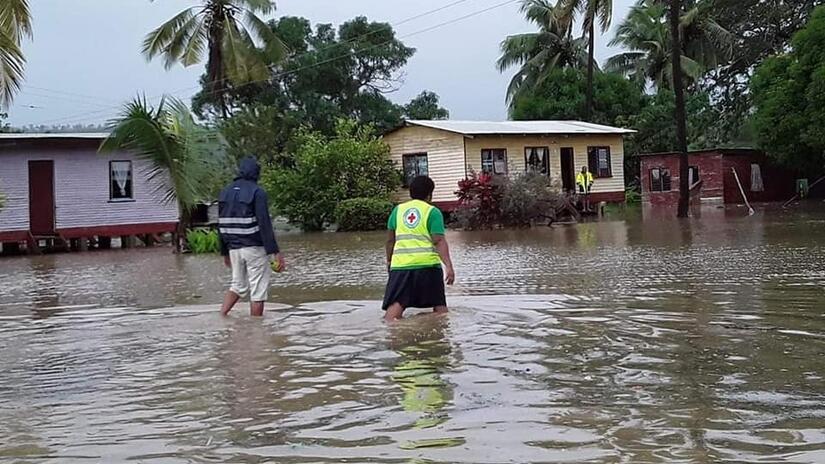Whether it’s the increasing power of storms, the proliferation of wildfires, worsening heatwaves and droughts – or the displacement of entire communities due to all the above — the impacts of climate change have been with us for some time.
This is why the IFRC is once again heading to the Global Climate Summit, COP28, in the United Arab Emirates, with an urgent message: there’s no more time to waste. The time to act is now and the action must be bold.
Just as world leaders must agree to reduce greenhouse gas emissions to prevent even worse humanitarian impacts, they must vastly scale-up adaptation action at the local level in order to reach the most at-risk and impacted people, according to the IFRC.
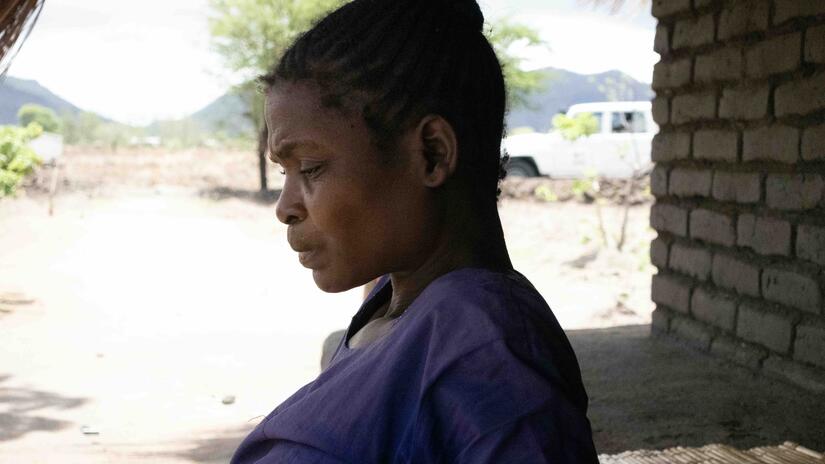
Martha Makaniko, a farmer from Chiwalo village in southern Malawi whose crops were destroyed by floods from Cyclone Freddy.
Photo: Anne Wanjiru/IFRC
People like Martha Makaniko, a farmer from Chiwalo village in the town Mulanje in Malawi. Earlier this year, Makaniko lost her home and all her crops due to unexpected flash flooding caused by Cyclone Freddy. After that, the normal rainfalls failed to come and now the El Nino phenomenon threatens to make the expected upcoming lean season even leaner.
"Year after year, it’s been getting harder to get good yields from farming and get a good earning,” says Makaniko. “We no longer rely on regular weather patterns. I used to get eight bags of maize from my field. Now I would be lucky to get two."
This kind of story is increasingly common in communities where the IFRC network is rooted. They are also the reason why the IFRC has been scaling up its own efforts to work with local communities and Red Cross and Red Crescent National Societies to alleviate immediate suffering — providing cash, food, water, hygiene and health support — while also preventing and reducing risks in the future.
This is also why the IFRC is urging world leaders assembling for the COP 28 Climate Summit to take the following urgent steps:
• prioritize local action
• increase financing to help communities adapt
• scale-up early action and measures that help communities anticipate risks
• strengthen climate resilient health systems and to help people avert, minimize and address loss and damage due to climate-related events.
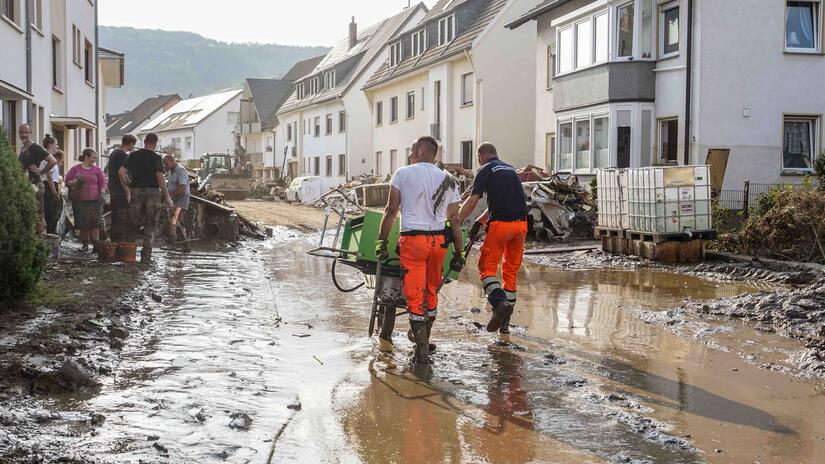
The German Red Cross responds after devastating floods in 2021.
Photo: German Red Cross
Worse before it gets better
Much more investment in all these areas is critical to help communities cope as the situation is likely to worsen before it gets better. The Intergovernmental Panel on Climate Change (IPCC) confirms that climate change is already contributing to an increasing number of humanitarian crises (with average global temperature at 1.15°C above 1850-1900 average).
And now there is a very real threat that temperatures will rise even further. Under current policies the world is on track for 2.8°C global warming by 2050, according to the United Nations Environment Programme.
In the short term, this year’s El Niño phenomenon is expected to compound the impact with human-induced climate change, pushing global temperatures into uncharted territory, according to the World Meteorological Organization.
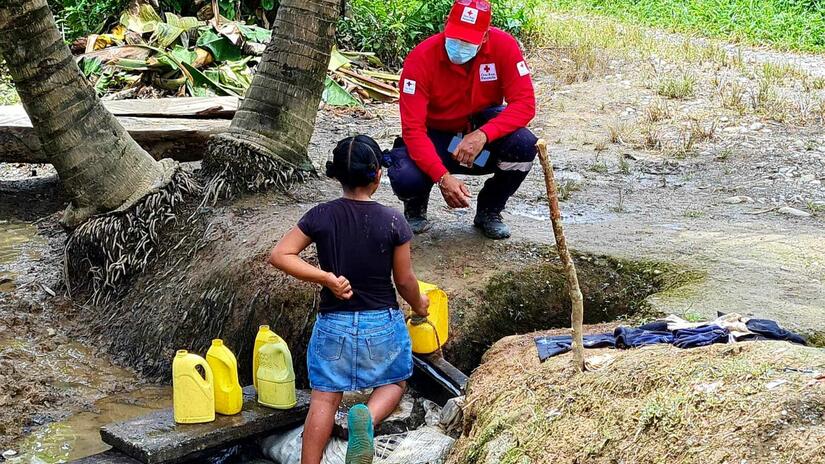
Panama Red Cross helps local communities with safe drinking water following heavy storms.
Photo: Panama Red Cross
Reasons for hope
There are some reasons for hope however. If urgent steps are taken, there is a chance we can slow or stop further temperature increases while also making communities far less susceptible to climate-related shocks.
Across the IFRC network, which includes 191 National Societies, there are numerous examples of communities working with the IFRC and others to make themselves more resilient so they can avoid the food insecurity, health risks and economic impacts of climate related disasters.
In Jamaica, for example, the Red Cross worked with a school for deaf students on a climate-smart project to reinforce their self-sufficient campus farm with a solar-powered irrigation system.
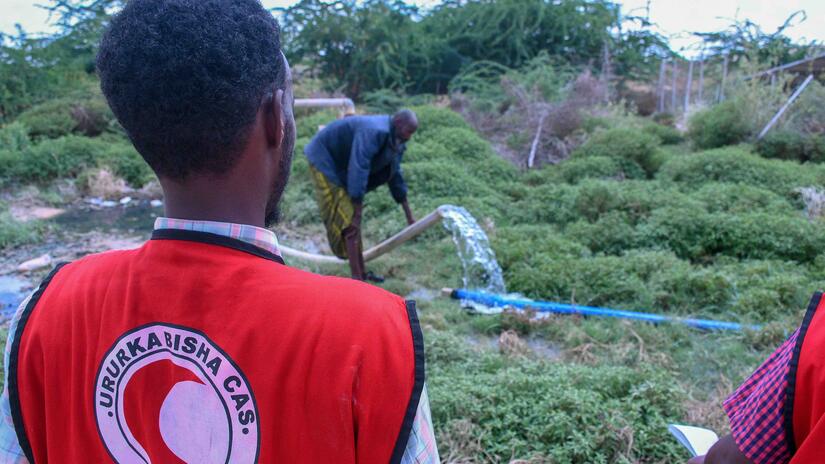
Water gushes from a pipe connected to a borehole recently re-furbished by the people of Cuun village, the Somali Red Crescent and the IFRC.
Photo: IFRC/Timothy Maina
In Somalia, the IFRC and the Somalia Red Crescent worked with the village of Cuun to reestablish small farms with the help of a new borehole for clean water and a pumping system to help them cope with multiple years of drought.
“We struggled to access clean water for drinking, cooking, bathing, and livelihood support,” says one of the community leaders, Yasiin Maxamed Jamac. “This had a negative impact on our health and well-being, and it made it difficult for us to grow crops, fruit, vegetables and raise livestock."
Now over 100 households have their own small farms — 100 metres by 100 metres — where they cultivate a variety of fruits, vegetables, and crops.

